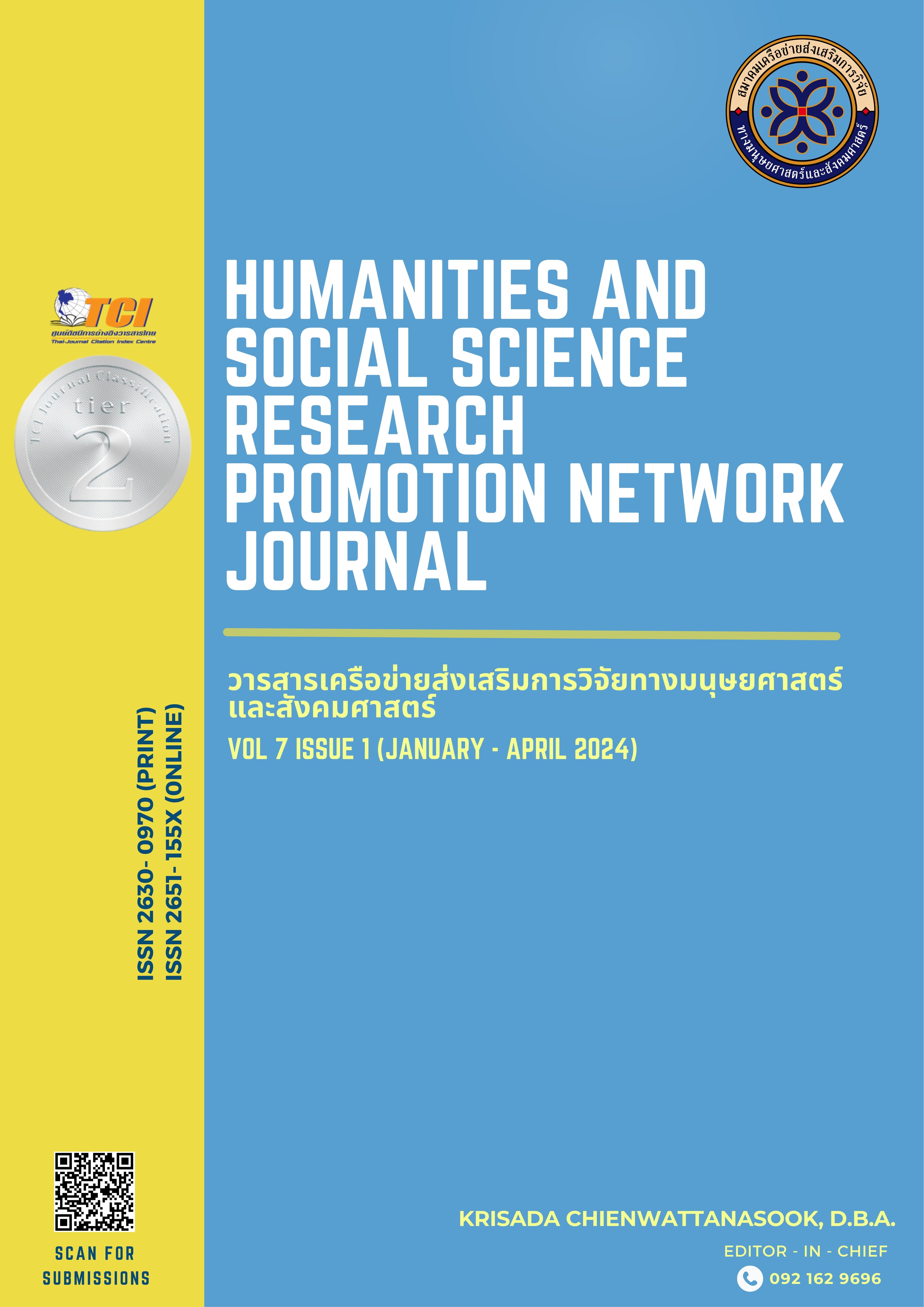ความเกี่ยวข้องของข้อมูลทางบัญชีในการกำหนดมูลค่าหลักทรัพย์ ในช่วงการแพร่ระบาดของ COVID-19 หลักฐานจากตลาดหลักทรัพย์แห่งประเทศไทย
คำสำคัญ:
ความเกี่ยวข้องในการกำหนดมูลค่าหลักทรัพย์ , กำไรต่อหุ้น , มูลค่าตามบัญชีต่อหุ้น , กระแสเงินสดสุทธิจากกิจกรรมดำเนินงานต่อหุ้น , สินทรัพย์ไม่มีตัวตนต่อหุ้น , ไวรัสโคโรน่าสายพันธุ์ใหม่ 2019บทคัดย่อ
งานวิจัยนี้มีวัตถุประสงค์เพื่อศึกษาความเกี่ยวข้องของข้อมูลทางบัญชีในการกำหนดมูลค่าหลักทรัพย์และเปรียบเทียบความเกี่ยวข้องในการกำหนดมูลค่าหลักทรัพย์ช่วงเวลาก่อนการแพร่ระบาดและระหว่างการแพร่ระบาดของ COVID-19 ข้อมูลที่ใช้ในการศึกษาคือ ข้อมูลรายปีของบริษัทจดทะเบียนในตลาดหลักทรัพย์แห่งประเทศไทย จำนวน 254 บริษัท จำนวน 6 ปี ระหว่างปี พ.ศ. 2560 – 2565 ใช้สมการถดถอยพหุคูณสำหรับการวิเคราะห์ข้อมูล โดยวิเคราะห์ด้วยช่วงเวลารวม รวมทั้งแบ่งช่วงเวลาก่อนการแพร่ระบาดฯ (พ.ศ. 2560 – 2562) และช่วงเวลาระหว่างการแพร่ระบาดฯ (พ.ศ. 2563 – 2565) ผลการวิจัยพบว่า กำไรต่อหุ้นและกระแสเงินสดสุทธิจากกิจกรรมดำเนินงานต่อหุ้น มีความเกี่ยวข้องเชิงบวกต่อราคาหลักทรัพย์ที่วิเคราะห์ด้วยช่วงเวลารวม โดยที่กำไรต่อหุ้นมีความเกี่ยวข้องในการกำหนดมูลค่าหลักทรัพย์สูงกว่ากระแสเงินสดสุทธิจากกิจกรรมดำเนินงานต่อหุ้น แต่ในช่วงเวลาก่อนการแพร่ระบาดฯ กำไรต่อหุ้นมีความเกี่ยวข้องเชิงบวก ในขณะที่มูลค่าตามบัญชีต่อหุ้นมีความเกี่ยวข้องเชิงลบต่อราคาหลักทรัพย์ สำหรับช่วงเวลาระหว่างการแพร่ระบาดฯ ทั้งกำไรต่อหุ้น มูลค่าตามบัญชีต่อหุ้น และกระแสเงินสดสุทธิจากกิจกรรมดำเนินงานต่อหุ้นมีความเกี่ยวข้องในการกำหนดมูลค่าหลักทรัพย์ แต่มูลค่าตามบัญชีต่อหุ้นมีความเกี่ยวข้องเชิงลบ โดยที่กระแสเงินสดสุทธิจากกิจกรรมดำเนินงานต่อหุ้นมีความเกี่ยวข้องในการกำหนดมูลค่าหลักทรัพย์มากขึ้นเมื่อเปรียบเทียบกับช่วงเวลาก่อนการแพร่ระบาดฯ สำหรับสินทรัพย์ไม่มีตัวตนต่อหุ้นไม่มีความเกี่ยวข้องในการกำหนดมูลค่าหลักทรัพย์ไม่ว่าจะวิเคราะห์ด้วยช่วงเวลารวมและการแบ่งช่วงเวลาการวิเคราะห์ทั้ง 2 ช่วง
เอกสารอ้างอิง
กรมควบคุมโรค กระทรวงสาธารณสุข. (2563). สถานการณ์ภาพรวมทั่วโลก. https://ddc.moph.go.th/viralpneumonia/ind_world.php
กิตติมา อัครนุพงศ์. (2560). การเปรียบเทียบความเกี่ยวข้องในการกำหนดมูลค่าหลักทรัพย์ของกำไร มูลค่าตามบัญชี และกระแสเงินสด: หลักฐานเชิงประจักษ์จากบริษัทจดทะเบียนในกลุ่ม SET100 ในประเทศไทย. วารสารวิชาชีพบัญชี, 13(38), 95-114.
ตลาดหลักทรัพย์แห่งประเทศไทย. (2564). COVID ทำให้บริษัทในตลาดหลักทรัพย์ฯ เปลี่ยนไปอย่างไร. https://www.setinvestnow.com/th/knowledge/article/203-covid-company-change
ประกาศเรื่อง ยกเลิกประกาศสถานการณ์ฉุกเฉินในทุกเขตท้องที่ทั่วราชอาณาจักร ประกาศ ข้อกำหนด และคำสั่งที่เกี่ยวข้อง. (2565, 29 กันยายน 2565). ราชกิจจานุเบกษา. เล่ม 139 ตอนพิเศษ 232 ง. หน้า 47-48.
พระราชกําหนดการบริหารราชการในสถานการณ์ฉุกเฉิน พ.ศ. 2548. (2548, 10 กรกฎาคม). ราชกิจจานุเบกษา. เล่ม 122 ตอนที่ 58 ก. หน้า 1-9.
สภาวิชาชีพบัญชี ในพระบรมราชูปถัมภ์. (2563). กรอบแนวคิดสำหรับการรายงานทางการเงิน. https://www.tfac.or.th/upload/9414/TiadgqggkP.pdf
Abdollahi, A., Pitenoei, Y. R., & Gerayli, M. S. (2020). Auditor’s report, auditor’s size and value relevance of accounting information. Journal of Applied Accounting Research, 21(4), 721-739.
Abdul-Shukor, Z., Ibrahim, M. K., Kaur, J., & Md-Nor, H. (2008). The value relevance of intangibles non-current assets in different economic conditions. International Review of Business Research Papers, 4(2), 316-337.
Al-Ani, Mawih and Tawfix, Omar Ikbal. (2021). Effect of Intangible Assets on the Value Relevance of Accounting Information: Evidence from Emerging Markets. Journal of Asian Finance, Economics and Business, 8(2), 387-399.
Alfaraih, M. (2009). Compliance with international financial reporting standards (IFRS) and the value relevance of accounting information in emerging stock markets: evidence from Kuwait [Doctoral dissertation]. Queensland University of Technology.
Badu, B. & Appiah, K. O. (2018). Value relevance of accounting information: an emerging country perspective. Journal of Accounting & Organizational Change, 14(4), 473-491.
Beisland, L. A. (2009). A Review of the Value Relevance Literature. The Open Business Journal, 2, 7-27.
Bowerman, S., & Sharma, U. P. (2016). The effect of corporate social responsibility disclosures on share prices in Japan and the UK. Corporate Ownership and Control, 13(2), 202-216.
Collins, D. W., Maydew, E. L., & Weiss, I. S. (1997). Changes in the value-relevance of earnings and book values over the past forty years. Journal of accounting and economics, 24(1), 39-67.
Dontoh, A., Radhakrishnan, S., & Ronen, J. (2007). Is stock price a good measure for assessing value-relevance of earnings? An empirical test. Review of Managerial Science, 1, 3-45.
Egiyi, M. A. (2021). Value-Relevance of Accounting Information in the Nigerian Stock Exchange. Global Journal of Finance and Business Review, 4(2), 19-28.
El-Diftar, D., & Elkalla, T. (2019). The value relevance of accounting information in The MENA region A comparison of GCC and non-GCC country firms. Journal of Financial Reporting and Accounting, 17(3), 519-536.
Eugenio, K. L., Parel, R. M. A., Reyes, K. M., Yu, K. B., & Cudiaet, C. (2019). How Does Value Relevance of Accounting Information React to Financial Cricis?. DLSU Business & Economics Review, 28(2), 133-141.
Francis, J., & Schipper, K. (1999). Have financial statements lost their relevance?. Journal of accounting Research, 37(2), 319-352.
Habib, A., & Azim, I. (2008). Corporate Governance and the value-relevance of Accounting information Evidence from Australia. Accounting Research Journal, 21(2), 167-194.
Holthausen, R. W., & Watts, R. L. (2001). The relevance of the value-relevance literature for financial accounting standard setting. Journal of Accounting and Economics, 31(1-3), 3-75.
Keener, M. H. (2011). The relative value relevance of earnings and book value across industries. Journal of Finance and Accountancy, 6, 1.
Kimouche, B., & Rouabhi, A. (2016). The impact of intangibles on the value relevance of accounting information: Evidence from French companies. Intangible Capital, 12(2), 506-529.
Kwon, G. J. (2018). Comparative value relevance of accounting information among Asian countries Focusing on Korea, Japan, and China. Managerial Finance, 41(2), 110-126.
Lopprevite, S., Rupo, D., & Ricca, B. (2019). Dose the voluntary adoption of integrated reporting affect the value relevance of accounting information? Empirical evidence from Europe. International Journal of Managerial and Financial Accounting, 11(3/4), 238-268.
Mirza, A., Malek, M., & Abdul-Hamid, M. A. (2019). Value relevance of financial reporting: Evidence from Malaysia. Cogent Economics & Finance, 7(1), 1651623.
Ohlson, J. A. (1995). Earnings, book values, and dividends in equity valuation. Contemporary accounting research, 11(2), 661-687.
Paolone, F., Tiscini, R., & Martiniello, L. (2020). Accounting and Value Relevance of Intangibles: A longitudinal Study in Itatian Stock Exchange 2010-2018. Journal of Modern Accounting and Auditing, 16(5), 201-210.
Saha, A., & Bose, S. (2017). The Value Relevance of Financial and Non-Financial Information: Evidence from Recent Academic Literature. In M.O. North and J.V. Akkeren (Eds.) Value Relevance of Accounting Information in Capital Markets (pp.220-245). DOI:10.4018/978-1-5225-1900-3.ch015.
Shamki, D. (2013). The Influence of Economic Factors on the Value Relevance of Accounting Information in Jordan. International Journal of Business and Management, 8(6), 89-104.
ดาวน์โหลด
เผยแพร่แล้ว
รูปแบบการอ้างอิง
ฉบับ
ประเภทบทความ
สัญญาอนุญาต
ลิขสิทธิ์ (c) 2024 พิเชษฐ์ สิทธิโชคสกุลชัย, สุวิทย์ ไวยทิพย์, พัทรียา เห็นกลาง

อนุญาตภายใต้เงื่อนไข Creative Commons Attribution-NonCommercial-NoDerivatives 4.0 International License.
บทความที่ได้รับการตีพิมพ์เป็นลิขสิทธิ์ของ ผู้เขียน
ทัศนะและความคิดเห็นที่ปรากฏในบทความในวารสารเครือข่ายส่งเสริมการวิจัยทางมนุษยศาสตร์และสังคมศาสตร์จะถือเป็นความรับผิดชอบของผู้เขียนบทความนั้น และไม่ถือเป็นทัศนะและความรับผิดชอบของกองบรรณาธิการ








